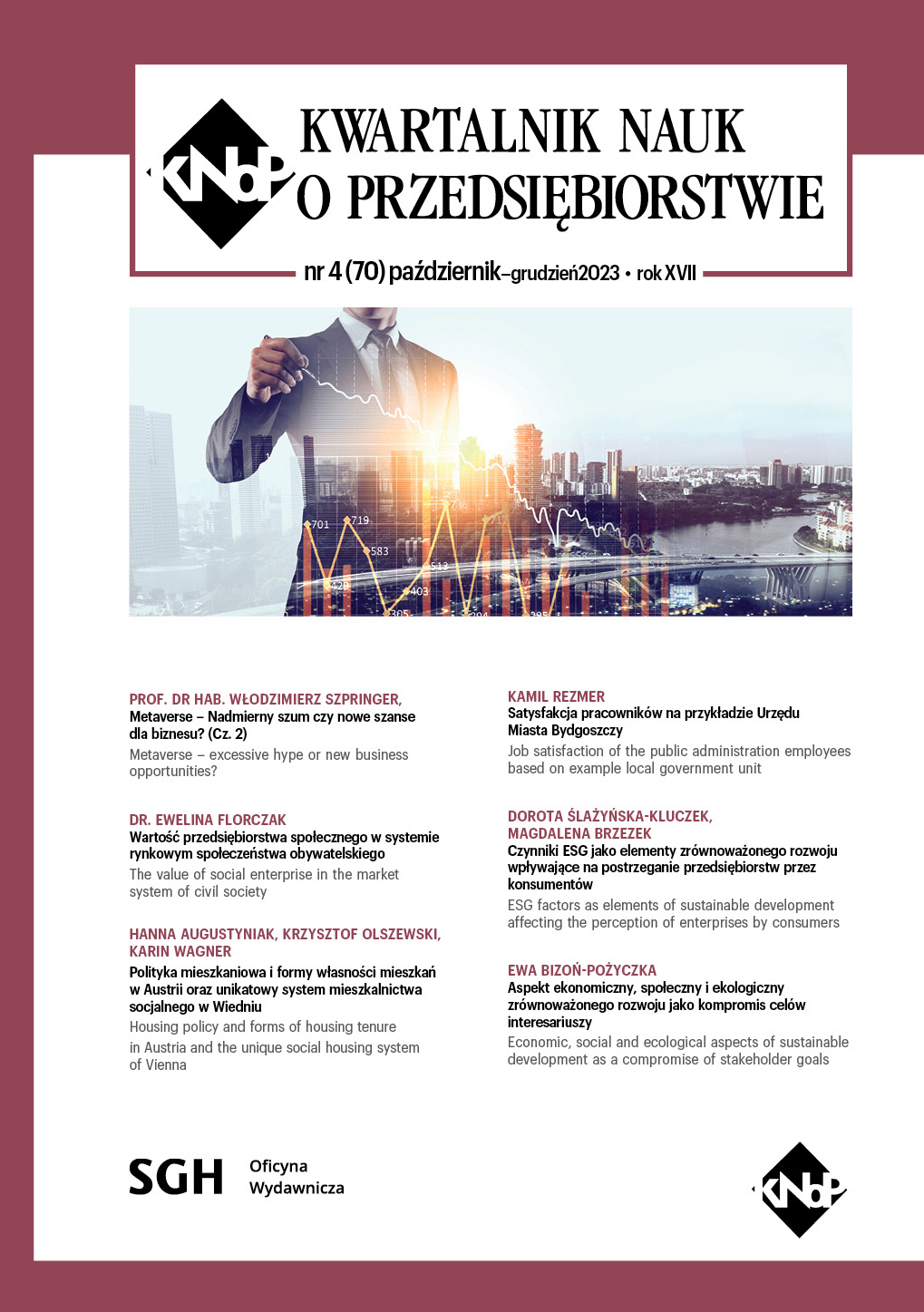The value of social enterprise in the market system of civil society
Main Article Content
Abstract
The article presents the concept of the value model of a social enterprise in the market system of civil society. The essence of the article is to isolate the elements of the model determining the location of a social enterprise in the market environment, as well as to isolate the relationships between these elements. The article indicates the need to define the areas of parameterization of the social added value of a social enterprise, which ultimately determine its value on the market. The main idea is based on taking into account such components of the model as demand, supply, consumer and social and consumer needs.
The text focuses on key problem threads:
1. Locating a social enterprise in the market system.
2. Isolation of key elements related to a social enterprise in the market system.
3. Defining the role of individual system elements in the functioning of social enterprises.
4. Determining the specificity of the relationship in the market system between the social enterprise and separate elements of the system.
5. Determining the place of generating social added value in the system.
Downloads
Article Details

This work is licensed under a Creative Commons Attribution 4.0 International License.
The author of the article declares that the submitted article does not infringe the copyrights of third parties. The author agrees to subject the article to the review procedure and to make editorial changes. The author transfers, free of charge, to SGH Publishing House the author's economic rights to the work in the fields of exploitation listed in the Article 50 of the Act of 4 February 1994 on Copyright and Related Rights – provided that the work has been accepted for publication and published.
SGH Publishing House holds economic copyrights to all content of the journal. Placing the text of the article in a repository, on the author's home page or on any other page is allowed as long as it does not involve obtaining economic benefits, and the text will be provided with source information (including the title, year, number and internet address of the journal).
References
Begg D., Fisher S., Vernasca G., Dornbusch R. [2014], Mikroekonomia, PWE, Warszawa.
Brdulak A. [2014], The importance of sustainable development – the ecological aspekt, „Zeszyty Naukowe Wyższej Szkoły Bankowej we Wrocławiu”, z. 1 (39).
Brdulak J., Florczak E. [2016], Uwarunkowania działalności przedsiębiorstw społecznych w Polsce, Oficyna Uczelni Łazarskiego, Warszawa.
Brdulak J., Florczak E. [2021], Usytuowanie przedsiębiorstwa społecznego w gospodarce, „Myśl Ekonomiczna i Polityczna”, nr 1–2, Oficyna Uczelni Łazarskiego.
Brdulak J., Florczak E. [2022], Przedsiębiorstwo społeczne w ujęciu ustawy o ekonomii społecznej versus teoria i praktyka gospodarcza, „Studia Ekonomiczne i Regionalne”, vol. 15 (4).
Brdulak J., Florczak E., Gardziński T. [2020], Przedsiębiorstwo społeczne elementem współczesnego ładu gospodarki kapitalistycznej, „Kwartalnik Nauk o Przedsiębiorstwie”, nr 2(55), Szkoła Główna Handlowa w Warszawie.
Duliniec A. [2011], Finansowanie przedsiębiorstwa. Strategie i instrumenty, PWE, Warszawa.
Florczak E. [2011], Przedsiębiorstwo społeczne w teorii konfirmy, „Kwartalnik Nauk o Przedsiębiorstwie”, nr 3 (20), Szkoła Główna Handlowa w Warszawie.
Florczak E. [2023], Mierniki społecznej wartości dodanej w kontekście zrównoważonego rozwoju, w: Florczak E. (red.), Zrównoważony rozwój jako trend kształtujący współczesną gospodarkę, C. H. Beck, Warszawa.
Jurek M., Rybacki R. [2014], Model homo oeconomicus i jego dostosowanie do współczesnych uwarunkowań, „Studia Ekonomiczne”, nr 180, cz. 1, Uniwersytet Ekonomiczny w Katowicach.
Kowalczyk S. [2023], Niemoc braci ekonomistów czy natura praw, „Kwartalnik Nauk o Przedsiębiorstwie”, nr 1 (67), Szkoła Główna Handlowa w Warszawie.
Kramer T. [1989], Rynek, reforma, równowaga, PWN, Warszawa.
Mynarski S. [1976], Cybernetyczne aspekty analizy rynku, PWN, Warszawa.
Opinia Europejskiego Komitetu Ekonomiczno-Społecznego „Innowacyjne narzędzia finansowe w rozwoju przedsiębiorstw o oddziaływaniu społecznym” (opinia rozpoznawcza) (2022/C194/07).
Pacut A. [2022], Rozwój przedsiębiorczości społecznej w Polsce, Wydawnictwo Naukowe Scholar, Warszawa.
Teichmann E. [1989], Polityka transportowa: EWG-RWPG-Polska, PWN, Warszawa.
The Social Business Initiative z 2011.
Wojcieska L. [2014], Współczesna koncepcja homo socio-oeconomicus, „Studia Ekonomiczne”, nr 180, cz. 1, Uniwersytet Ekonomiczny w Katowicach.

